Hijab Official Facing Death Penalty Over Same-Sex Video Is Detained
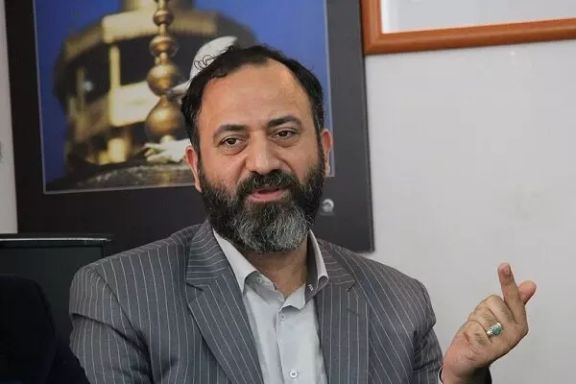
A former hijab watchdog official is being detained facing a possible death sentence for homosexuality after a video showed him having sex with another man.

A former hijab watchdog official is being detained facing a possible death sentence for homosexuality after a video showed him having sex with another man.
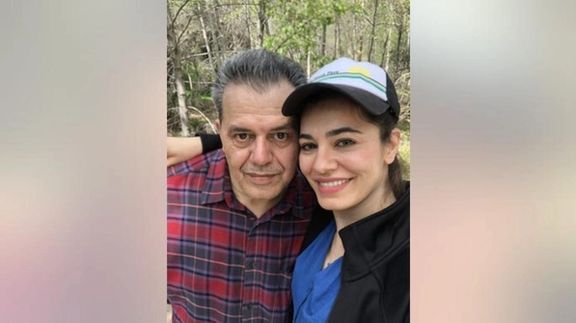
The daughter of a German-Iranian US citizen who has been sentenced to death in Iran has called on Washington and Berlin to “take action” and save her father.
Jamshid Sharmahd, a 68-year-old software developer and California resident, was allegedly abducted during a visit to the United Arab Emirates in 2020 and forcibly taken to Iran.
In April, the Iranian judiciary sentenced him to death on charges of "spreading corruption on Earth," a verdict upheld by Iran's Supreme Court.
His family vehemently denies the allegations, and Amnesty International has condemned the trial as a sham.
At the end of last week, German officials disclosed that Foreign Minister Annalena Baerbock had held discussions about Germans detained in Iran with her Tehran counterpart, Hossein Amir-Abdollahian.
On Sunday, Jamshid’s daughter Gazelle Sharmahd responded, tweeting: “I have requested an input from the German Government regarding what was discussed about the hostages in Iran, in particular about my father Jamshid Sharmahd.”
In remarks targeted at US President Joe Biden, she said: “What are you doing for the US hostages after you handed the Islamic regime $6 billion, and still couldn’t save all US nationals like my dad. We are still waiting for you to take action. Action that won’t further threaten my dad‘s life and won’t further empower his kidnappers.”
She earlier expressed frustration with the passing of responsibility between Germany and the US, stating, "The issue is tossed back and forth, with each side claiming 'not my citizen,' 'not my jurisdiction.' And we're not getting through to them."
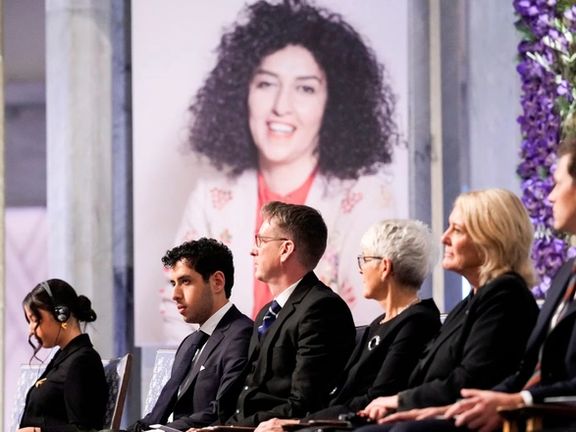
Nobel Peace Prize winner Narges Mohammadi, imprisoned in Tehran, has criticized Western governments for their half-hearted support for Iranians who fight for democracy and human rights.
In her acceptance speech –sent from the notorious Evin prison, read by her teenage daughter in Oslo– Mohammadi said the Islamic Republic is in a state of “unstable equilibrium” with very little popular support, and will give way to democracy sooner rather than later.
“But the reality is,” she added, “that [foreign] governments and the UN have not had the conviction, the practical coherence, and the proactive approach that seemed necessary and fitting for the kind of support that wills the victory of the people of Iran.”
Iranian dissidents often cite lack of foreign support as a contributing factor to their nonsuccess in getting rid of the Islamic Republic. When it comes to defining the nature and the scope of such support, Western governments are mostly unclear and divided, dissidents argue.
“Western governments should not delay democracy and human rights by adopting confused strategies that are concerned with the continuation of the Islamic Republic's rule,” Mohammadi said.
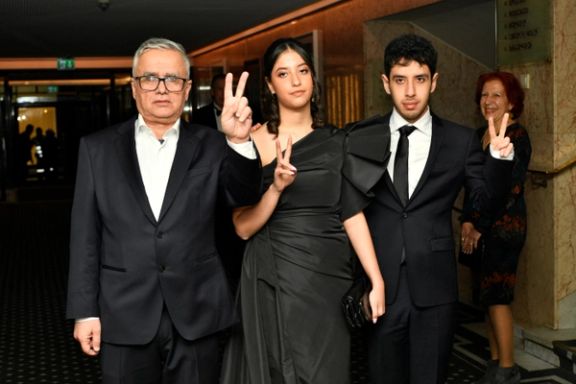
Her words seem to be directed at Western leaders who consider it to be wiser –or see no alternative but– to deal with those who rule Iran as long as they’re in control.
“The policies and strategies of Western governments have been too superficial to give priority to the will of the Iranian people to achieve their goals,” Mohammadi said.
The Norwegian Nobel committee awarded Mohammadi for her "fight against oppression of women in Iran" and the promotion of human rights for all, in what has been read by some as a decision to aggravate the regime in Tehran.
Narges Mohammadi has spent much of the last decade in prison, serving multiple sentences on charges including spreading propaganda against the Islamic Republic. She was symbolically represented on stage in Oslo by a portrait of her and an empty chair.
Mohammadi’s husband, Taghi Rahmani, and their twins –who live in exile in France– attended and received the reward on her behalf.
The event, supposedly a universal source of joy for Iranians, became yet another trigger for heated debate on social media when Rahmani said in an interview on the sidelines of the ceremony that Iranians inside Iran do not want sudden change.
Some read this as a statement in support of Reformists and attacked Rahmani, accusing him of betraying his wife’s suffering and promoting the regime’s agenda.
Others, including some prominent voices on social media whose loved ones have been killed by the regime in recent years, created a double-hashtag (which would translate in English as #DeathToIslamicRepublic and #DeathToReformMovement) with no reference to Rahmani but coinciding with the event.
Taghi Rahmani, a renowned journalist and political activist, had spent more than 13 years in prison before he left Iran in 2012. He’s been a vocal critic of the Islamic Republic for many years but believes any sudden political change in Iran to be a “strategic mistake.”
Unlike his Nobel winning wife, Rahmani used his platform Sunday to decry foreign influence, citing the examples of the 2003 invasion of Iraq and President Donald Trump’s unilateral abandonment of the JCPOA nuclear agreement with Iran.
Mohammadi, although vague in her language, seemed to be welcoming –or even encouraging– outside help in her Nobel speech.
“It is expected that the global civil society provides more tangible support to the Iranian people's efforts towards democratic and non-violent transition to achieve peace, democracy, and human rights.”
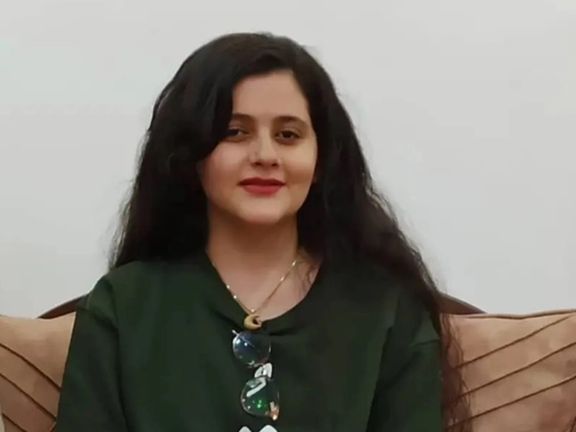
Mojgan Eftekhari, the mother of Mahsa Amini, strongly denounced the authorities for obstructing their family's departure for France to receive the Sakharov Prize.
On Friday, as Amjad Amini, Mojgan Eftekhari, and Ashkan Amini, the father, mother, and brother of Mahsa Amini, were en route to France for the Sakharov Prize ceremony, they were informed at the airport about the travel prohibition, with their passports confiscated.
Mahsa Amini, a 22-year-old woman, was detained by Iran's morality police in mid-September 2022, leading to her tragic death within three days of critical head injuries, sparking nationwide protests.
Expressing her frustration on Instagram, Eftekhari questioned the government's ignorance, stating, "How clueless the rulers are, not realizing the impact of Mahsa's name?" She labeled the Iranian officials as "deceptive rulers," accusing them of consistently attempting to erase Mahsa's indelible memory through deceitful maneuvers.
Earlier, Roberta Metsola, the President of the European Parliament, urged the Islamic Republic to lift the travel ban imposed on Mahsa Amini's parents and brother.
The European Union declared on October 19 that Mahsa Amini and the Women, Life, Freedom movement would be recipients of the Sakharov Prize.
The Amini family has faced heightened security pressure since Mahsa's death in the custody of the morality police, coinciding with the onset of the Iranian people's uprising against the Islamic Republic.
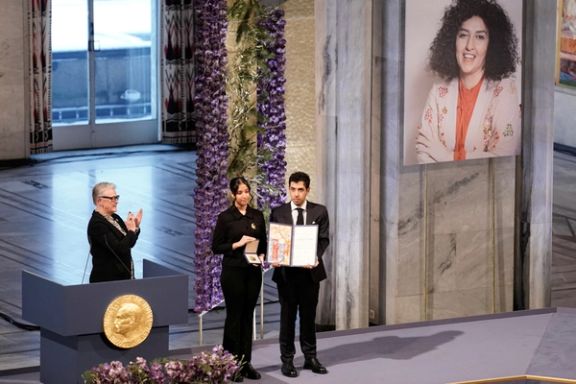
The Nobel Peace Prize ceremony honoring Iranian activist Nargess Mohammadi took place in the Norwegian capital of Oslo while she is on hunger strike in prison.
Mohammadi, a human rights activist currently incarcerated, was absent from the ceremony, with her family accepting the award on her behalf.
The Nobel Peace Prize ceremony on Sunday coincided with Human Rights Day. On October 6, as announced by the Nobel Committee, Mohammadi was awarded the Nobel Peace Prize for 2023 "due to her struggle against injustice towards Iranian women and her efforts to advance human rights and freedom for all."
In the absence of the imprisoned human rights activist, the prize was received by her husband, Taqi Rahmani, and their twin children, Kiana and Ali.
In a pre-ceremony interview with Iran International, Ali Rahmani stated that his mother, who is currently in prison, should have been present at the award ceremony. He and his sister, Kiana, aim to represent their mother's voice.
Kiana also expressed admiration for individuals of similar age “who took to the streets and sacrificed their lives for the cause.” She emphasized that the Nobel Peace Prize is not only for her mother but also for all Iranian women.
Narges Mohammadi, born in 1972 in Zanjan, holds a degree in applied physics. She commenced civil and political activities during her university years. Over the years, she has received several international awards, including the Sakharov Prize from the American Physical Society in 2018, the International Press Freedom Award in 2016, and the Alexander Langer Award in 2009.
In recent years, Mohammadi has faced multiple arrests, trials, and many years in prison for her human rights activities. She was last arrested in 2021 and has been in Evin Prison since then.

Controversy has erupted in Iran after hardliners demanded specifically designed gowns conforming to hijab rules to be made compulsory in hospitals and operating rooms.
Twelve versions of Islamic surgical gowns have been designed for female patients in the operating room to comply with Sharia rules, announced Mohammad-Hossein Taheri-Akerdi, the secretary of a state body responsible for promotion of Islamic standards, whose main concern has always been promotion of hijab.
Taheri-Akerdi said Tuesday that the standard clothing currently worn by patients in hospitals violates women’s “dignity” and responsible government bodies have been instructed to identify the standards of religiously required and forbidden aspects in respect to “hijab and chastity” in hospital environments.
The entity that Taheri-Akerdi represents is a state-funded organization with a budget of 1.25 trillion rials (around $2.5m) in the current fiscal year, with an increase of 125 percent compared to the previous year. An even higher budget is expected to be allocated to the organization for the next year.
Not only those who oppose the compulsory hijab, but also many religious people are against the various measures that religious fundamentalists are employing to enforce the hijab rules.
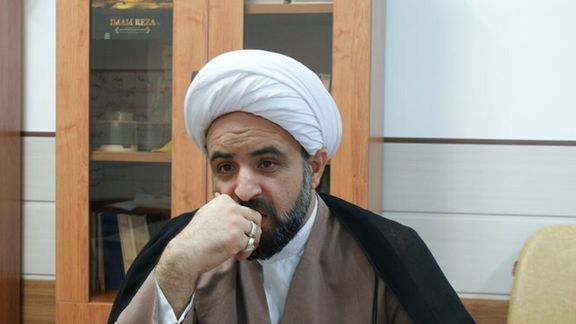
“One feels like standing in front of a hidden camera and waiting for someone to say that this [situation] is just a joke, but no, these are Taheri-Akerdi’s exact words,” a commentary by Mostafa Danandeh a regular contributor to the conservative Asr-e Iran news website said.
“I don't know how upsetting the reading of these news must be for patients and their families who are dealing with the problems of finding their medication, hospital admission and its costs these days. They see that there are people in this country who are looking for Islamic surgical clothes instead of worrying about availability of medicine and the conditions of hospitals,” he wrote.
He added that he thinks the entity that seriously needs reform is the same organization that needlessly tries to impose obscure religious standards and trying to anger people with its decisions.
Some clerics and Islamic scholars such as Ayatollah Seyed Mohammad-Ali Ayazi, a member of a reformist clerical association in Qom, have also criticized the demand for Islamification of hospital gowns.
In an interview with Salamat News (Health News) Thursday, Ayazi criticized fundamentalists and said from the religious point of view demanding Islamic hospital gowns to be designed is a matter of minimal importance when both doctors and patients must deal with such serious problems as shortages of medicine and equipment.
Some media and social media users have pointed out that there may be a hidden agenda in the official’s declaration about unsuitability of current hospital gowns and need for designing Islamic ones.
“But the point that has not been paid much attention to is this story’s economic aspect like the open and hidden financial dimensions of government measures in regard to hijab clothing … and in whose pockets the profits find their way?” a commentary in Faraz Daily, a news website, wrote Saturday.
Faraz Daily mentioned in its article that there are no official data on the market turnover of hijab clothing such as fabric for making the long black veils, called chador in Persian, that is largely imported.
The article also pointed out that the secretary of the Cultural Council said in September 2022 that the black veil was “an essential commodity” and said the government must encourage importing fabrics for the veils by lowering import tariffs. In addition, when a commodity is listed as essential, importers can receive foreign currency from the government at preferential lower rates. This practice has been a major source of corruption in recent years.
A black veil made with imported fabric can cost as high as 20m rials ($400), with the cheapest ones made with domestically produced fabric costing around one-third of that.
Reza Seqati, the former director-general of the culture ministry in Gilan province, is being held in detention, according to Mizan News Agency, affiliated with the Iranian judiciary.
On Monday, the criminal court in Tehran issued the detention order after investigating and evaluating the case.
In July, Seqati was dismissed from his official post after a video showing him engaging in sex with an unidentified man surfaced, potentially leading to the death penalty under Iranian law. Mizan referred to the video as the "indecent film in the Gilan case" and verified Seqati's involvement.
Senior Iranian lawmaker Hassan Norouzi called for the death penalty for Seqati in October, saying. "If the allegations against Reza Seqati are substantiated, there is an unequivocal necessity for imposing stringent consequences. He must face the full force of the law and be shoved off the mountain and be killed to teach a lesson to others."
Seqati, reported to be married with three daughters, was once recognized as a fervent supporter of compulsory hijab regulations in Gilan. Back in May, he declared the inauguration of a hijab hypermarket in the province and initiated efforts to set up a hijab exhibition at Rasht's central exhibition hall, emphasizing the production of clothing aligning with "Iranian-Islamic culture."
Reports last month hinted at Seqati assuming a new position, which the ministry promptly denied.
Some speculate that Seqati's arrest, several months after the incident, is a response to public criticism regarding the lack of arrests in the Debsh tea corruption case. Allegedly involving the embezzlement of funds from the Debsh Tea Company, the $3.5 billion corruption scandal implicates ministers of agriculture and industry, as well as the heads of the Central Bank of Iran and Iranian Customs Administration.